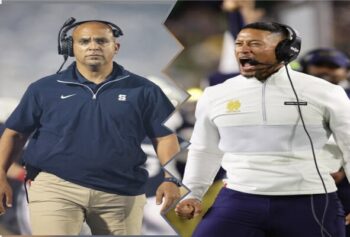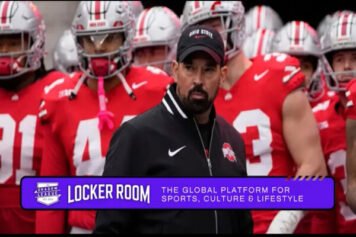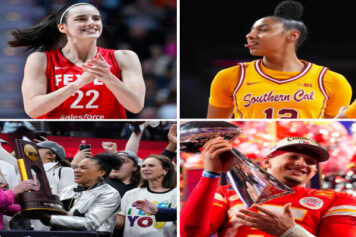Players should get paid for use of their name, likeness and image, but the NCAA is still fighting the inevitable.
A bill asserting that athletes at California schools could earn compensation for use of their own name, image or likeness, beginning in 2023, easily passed in the state Senate last month, 31–4.
It should have been a watershed moment in the history of amateur sports in America. The NCAA would have been wise to accept the ruling of the state’s courts and show that it can be progressive and flexible.
Unfortunately, the NCAA continues to live in the past as the world changes around it. The governing body refuses to adjust to a sports and educational landscape that has made it impossible to justify its archaic rules prohibiting athletes who have the brand, potential, and business savvy to earn wealth from acquiring it.
NCAA President Mark Emmert has written letter to two California Assembly committee chairs that implies schools in the state could be barred from NCAA championships if athlete name-image-and-likeness bill that has passed state Senate becomes law: https://t.co/MBrG2QhtEB
— Steve Berkowitz (@ByBerkowitz) June 24, 2019
When it comes to common sense, the NCAA has always been a step behind the social curve. Then again, it’s almost impossible for the governing body to continue exploiting student-athletes unless it keeps ignoring what everyone else has been saying for years.
If the many lawsuits the NCAA has litigated for exploiting the likeness and images of Black student-athletes didn’t wake up the governing body, then you’d think that the hundreds of millions of dollars in revenue that Duke sensation Zion Williamson generated would finally force the NCAA to adjust its restrictive rules concerning student-athlete compensation. Or at least admit that they are getting paid like a mug off these black kids and just don’t want to mess up a good hustle.
The issues of college athletes being compensated, the one and done epidemic and transfer rules for athletes have long been debated, with the conversation intensifying over the last few years.
For the many thousands of student-athletes, the allure and benefits of playing college sports created opportunities that many would kill for.
Looking in from the outside, many assume a full athletic scholarship and the opportunity to represent your school is reward enough for the tens of thousands of hours of practice, travel and sacrifice that athletes and their families put in to play in the NCAA.
To some extent, that holds true.
The NCAA is getting whooped by common sense & the law in Ed O'Bannon suit, so they're just taking their ball home: http://t.co/iFjOAUeAZk
— John Rowa (@JohnRowa) July 17, 2013
But for athletes such as Ed O’Bannon, Morgan Harvey, Daisha Simmons, Jeremy Bloom, the football players at Northwestern and many others who recognize the true value of what they create for their university, the NCAA has been a system of oppression similar to that of a plantation.
After pulling back the richly embroidered cloak emblazoned with NCAA royalty, these athletes recognized the disparity and hypocritical nature of the 501(c)3 organization that raked in $1 billion in revenues last year and are fighting for the rights of all of the student-athletes competing across all of the fields, arenas and stadiums across the country.
A growing sentiment is that star student-athletes in high revenue collegiate sports should be able to get paid for their services, beyond scholarships. Under the current oppressive model, they are essentially unpaid laborers for the university. The issue has hit critical mass.
NCAA president Mark Emmert suggested that if a California bill allowing in-state college athletes to be compensated passes, schools could potentially be barred from competing in NCAA championships, a letter sent to the chair of two State Assembly committees last week said.
According to SI.com “Emmert has asked that committees postpone their evaluation of the bill as the NCAA examines rules regarding athletes making money for their names, images, and likenesses.
“We recognize all of the efforts that have been undertaken to develop this bill in the context of complex issues related to the current collegiate model that have been the subject of litigation and much national debate,” Emmert said in his letter.
“Nonetheless, when contrasted with current NCAA rules, as drafted the bill threatens to alter materially the principles of intercollegiate athletics and create local differences that would make it impossible to host fair national championships. As a result, it likely would have a negative impact on the exact student-athletes it intends to assist.”
It’s all about control for the NCAA which has ruled with an iron fist and maneuvered with impunity for so long. Instead of evolving, the NCAA has decided to double up on the stubbornness and continue to challenge progress.
California legislators have approved laws for California-based college athletes to be able to make money. Mark Emmert is asking for modifications. But if California pushes this through, it will force the NCAA's hand—and that would be really interesting. https://t.co/bnFMPoxVlA
— Matt Norlander (@MattNorlander) June 24, 2019
In recent years, the governing body has been the target of attacks and the subject of documentaries by superstar athletes for rules, policies, and practices that in 2019 seem exploitative, outdated and racially-oppressive.
Universities across the country made a grip off Zion Williamson’s one year at Duke. Ratings were up and the house was sold out whenever Zion came to town. It was a major win for NCAA athletics. His charisma, dunk game, and magnetism was the talk of the sports world. He was a walking billboard who would go on to become the No. 1 pick in the 2019 NBA Draft.
Ironically, under the NCAA’s system, everyone got paid off Zion’s likeness, image, and name expect the Williamson Family. And that doesn’t add up.
When Zion was injured after his Nike sneaker exploded, the conversation about student-athlete compensation took off and it truly became a mainstream debate with most people on the side of the athlete.
The NCAA doesn’t like being under pressure. So people have had to find a way to maneuver around a system that TNT analyst Kenny Smith has called “predatorial.”
With the high school to pro NBA pipeline about to open back up in the next few years, athletes are circumventing NCAA rules by using various paid pro leagues that are now available to high school kids who want to get right to the cabbage rather than spend a season or two vacationing as broke college kids and unpaid interns for a major university. The NCAA won’t pay players, so these guys found a way to still get paid for their likeness and brand.
The college game will undoubtedly suffer if players like Zion don’t have to spend a year at Duke before going pro, but that seems inevitable. There are so many more ways for young people to get money these days with the advent of social media. Times are changing and the NCAA doesn’t want to adjust. Instead, they resort to their old tactic of playing the bully and ignorant to the stone cold facts. When will it stop?



